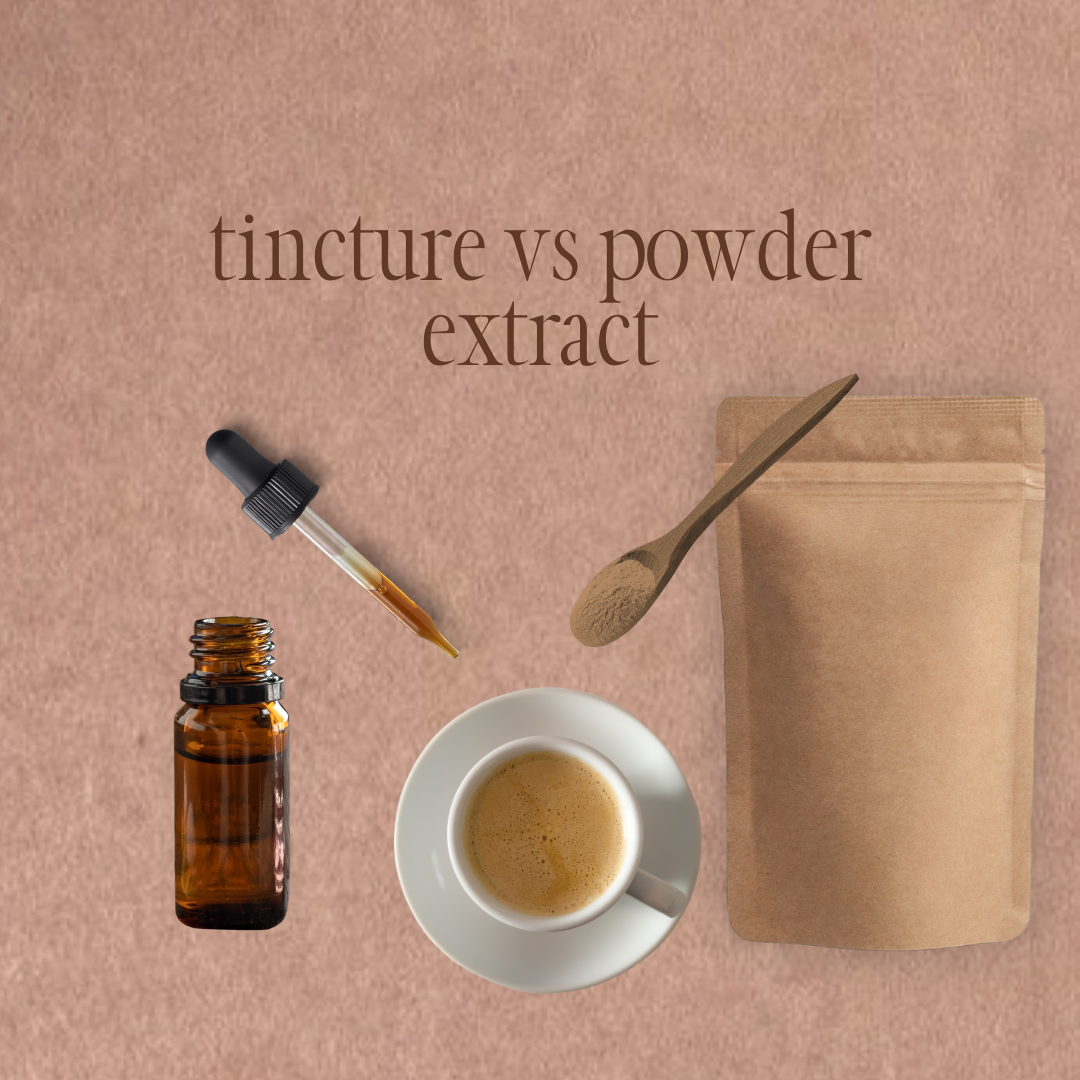
· Autor Joanna Maja Niemczycka
What is best tincture or powder extract when choosing functional mushrooms?
With the different ways of supplementing mushrooms, you might wonder if you should choose a liquid tincture or a powder. Functional mushroom extract powders, encapsulated powders and tinctures are both popular ways to consume medicinal mushrooms, and offer unique advantages.
Extract powders are typically made by drying and grinding the mushroom fruiting body or mycelium into a fine powder. They can be made using water, alcohol or a combination of both, and are typically more concentrated than tinctures. Powders are often added to hot water, coffee, milk, or other beverages such as smoothies. Powder extracts even when having the same package size as tinctures come as concentrated powder without add ons, water or alcohol in it, so they are much more cost efficient in the long run. They also have longer shelf life. They may take slightly longer to be absorbed and take effect in the body compared to tinctures. On the other side, extract powders may have longer lasting effects in the body compared to tinctures due to their slow-release nature. Because they take longer to be absorbed and metabolized, the effects may be sustained over a longer period of time.
Extract powders may have additional advantages over tinctures, especially when it comes to alcohol content. Some people prefer not to consume alcohol or limit their alcohol intake, and extract powders offer a convenient alternative. Some tinctures are without alcohol, but it should be specified in the product description as alcohol-free. Additionally, some extract powders are double extracted using water, which increases the bioavailability of the active compounds in the mushrooms.
Tinctures are typically made by soaking the mushroom's fruiting body or mycelium in alcohol and water to extract beneficial compounds. The resulting liquid can be taken directly or mixed with other beverages or food.
One of the main advantages of tinctures is their rapid absorption and action. The alcohol in the tincture can increase the absorption of the active compounds in the mushrooms, allowing faster effects. They might act quickly but their benefits are also short lasting due to its immediate release.
Ultimately, the choice between extract powder or tincture depends on personal preference and desired effects. Extract powders may be more cost-effective and have longer lasting effects, while tinctures may be more convenient and have a faster onset of action, especially when they are made with alcohol, as alcohol as a carrier might speed up absorption.
Things you might also consider that we have not covered in this article:
- Which part of the mushroom is used in the product: the fruiting bodies (part above the ground), mycelium, or the whole mushroom?
- If both tinctures and extracts have a similar DER (Genuine Drug Extract Rate), meaning: how much product was used to produce the finest extract?
- Would you like alcohol in your supplement?
- How important is the product's taste?
From a therapeutic point of view, if you are choosing medicinal mushrooms to combat your seasonal allergies, as you are in the midst of your symptoms, you might opt for Reishi tincture, considering it would be highly concentrated and acting fast. However, if you want to prevent allergies or long term stress with mushrooms you might opt for powder extracts.
Due to its fine powdered particle size, our products may be absorbed and work almost as quickly as a tincture. Some of our clients using Lion's Mane extract powder feel their concentration and focus improving within half an hour to an hour after consumption. This is even after the first dose, and the effect lasts for a few days. A tincture in comparison, might act faster, but its effect won't be as long lasting as powdered extracts.
Additionally, it is worthwhile to mention the taste. Personally, I prefer the powdered version, as I dislike the taste of alcohol. I make taking mushrooms part of my routine to not say a daily ritual. If I was trying to only have the benefits of the mushrooms without making it into a ritual, I would opt for a quick shot of powdered mushroom dissolved in water or milk over a sublingual tincture extract any day, as in the tincture for me the alcohol taste is killing the pleasure of mushrooms.
Mushroom powdered extracts when organic and coming from the natural origin will taste tempting, cozy and umami. Our Lion's Mane tastes mildly sweet with oat milk. Sometimes you might not even notice it. 8 Mushroom Extract offers more umami, something between cereal milk coffee and chocolate notes.
Tincture might taste more like your usual supplement, with an alcohol taste, but you can easily mask it with orange juice or coffee.
To sum it up: Extract powders might be cheaper and more concentrated over time giving you long-lasting health benefits. They might also be more suitable for you if you want to avoid alcohol, and if you want to make a mushroom latte part of your cozy routine.
Tinctures might be more fast acting, but more expensive. They might be an excellent choice if you like to take your supplements straight from a bottle.
Your lifestyle, taste preferences and therapeutic needs might be a significant factor in which option you choose.
It's always recommended to consult with a healthcare professional before adding supplements to your diet.